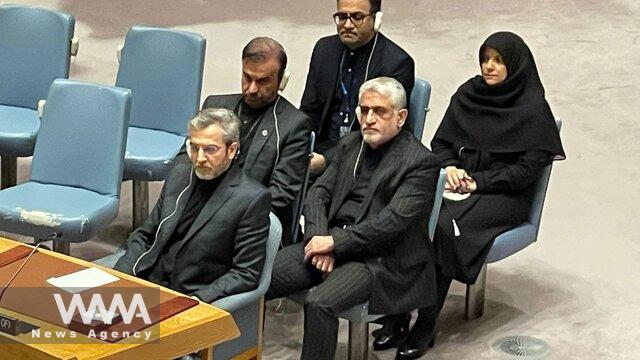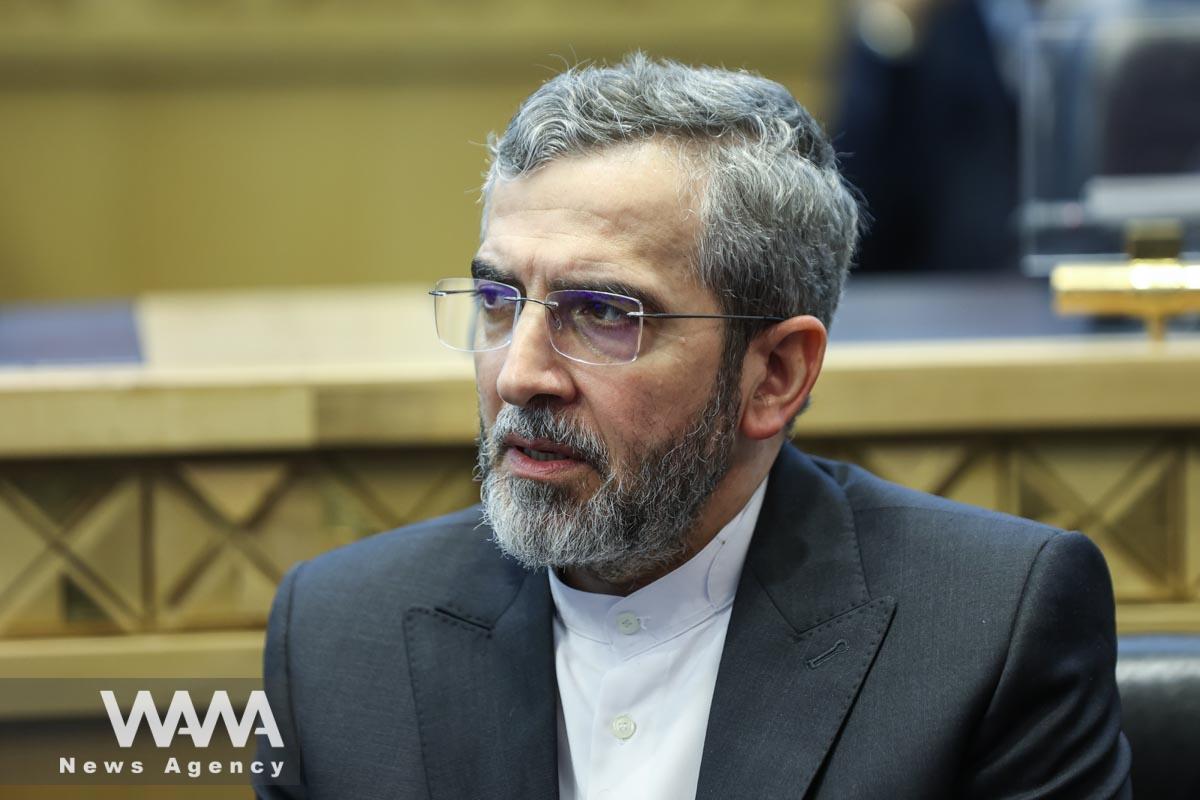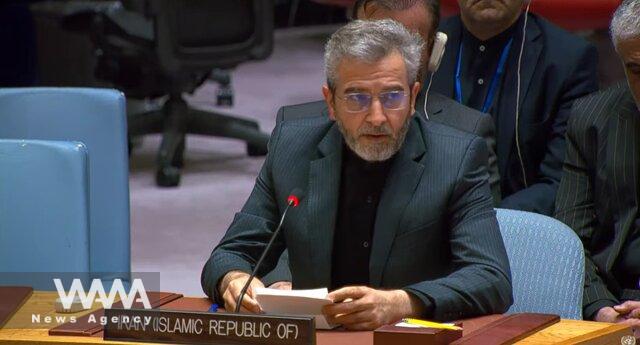Iran’s New Foreign Policy Focuses on Multilateralism: Bagheri
WANA (July 17) – Ali Bagheri, the acting Minister of Foreign Affairs of the Islamic Republic of Iran, delivered a speech on Tuesday at a high-level United Nations Security Council meeting concerning “Multilateral Cooperation for a More Sustainable, Democratic, and Just World Order.”
At the beginning of his speech, Bagheri congratulated Russia on its presidency of the Security Council and thanked them for the timely organization of this initiative.
The senior Iranian diplomat emphasized that “effective multilateralism is essential to ensure international peace and security,” adding, “We stress the importance of such initiatives to highlight the need for multilateralism and to underscore the harmful consequences of selfish unilateralism.”
He stated, “The Islamic Republic of Iran, as a founding member of the United Nations, reaffirms its enduring commitment to effective multilateralism based on international law and the principles of the UN Charter.”
Bagheri then outlined five key points from the Islamic Republic of Iran.

WANA – Ali Bagheri’s speech on 16/07/2024 at a high-level United Nations Security Council, New York
Resistance Is a Response to Unilateralism
Regarding the first point, he said: “The United Nations was established not only ‘to save succeeding generations from the scourge of war’ but also to ‘develop friendly relations among nations based on respect for the principle of equal rights and self-determination of peoples.’ These and other lofty principles and objectives enshrined in the Charter can only be achieved through multilateral cooperation. Unilateralism is contrary to peace and justice.”
The second point emphasized that the sovereignty of states is fundamental to the United Nations system. This principle is based on the right of each nation to self-determination, allowing it to shape its destiny. “The prohibition of the threat or use of force,” “the peaceful settlement of disputes,” and “non-interference in the internal affairs of other countries” are all aimed at protecting the sovereignty of nations against external aggression and ensuring friendly relations among them. Unilateralism undermines these fundamental principles of the United Nations and invites injustice, confrontation, and war.
For the third point, Bagheri noted: “The United Nations, as the greatest symbol of Multilateralism, is suffering from the scourge of unilateralism. Unfortunately, some permanent members have frequently misused the Security Council for their strategic or political agendas. On the one hand, they have used the Council’s leverage to pressure sovereign countries; on the other hand, they have prevented the Council from taking action to stop aggression and breaches of peace by their allies.”
He highlighted: “A clear example is the decades-long vetoing of any meaningful decision by the United States regarding the ongoing genocide by the Israeli regime against Palestinians and its repeated aggressions against regional nations. Here, I must emphasize that the support and solidarity of the Islamic Republic of Iran with resistance groups are legitimate actions within the framework of international law, aimed at ending occupation and aggression in the region.”
Bagheri also described “resistance” as “a response to unilateralism and the biased support for a criminal regime committing genocide in Gaza and Palestinian territories.”
The Security Council Cannot Evade Its Responsibility for Violating the Rights of the Iranian People.

Bagheri: The U.S. unilateral withdrawal from JCPOA exemplified unilateralism in the international arena
WANA (July 16)– Statement By H. E. Mr. Ali Bagheri, Acting Minister of Foreign Affairs of the Islamic Republic of Iran, Before the Security Council High-Level Ministerial Meeting, “Multilateral cooperation in the interest of a more just, democratic and sustainable world order” New York- 16 July 2024 بسم الله الرحمن الرحیم Mr. President, At […]
On the fourth point, Bagheri said: “Multilateralism requires respect for the division of labor among the UN organs. The Security Council’s creeping encroachment into issues beyond its charter-defined mandate jeopardizes the integrity of the Charter as an intergovernmental treaty and diverts the Council from its proper function. Additionally, ‘UN members agreed to accept and carry out the Security Council’s decisions by the Charter.'”
He further remarked: “I want to refer to the unjust resolutions imposed against the Islamic Republic of Iran from 2006 to 2010, which were the result of baseless U.S. allegations about Iran’speaceful nuclear program, violating Iran’s rights under the Non-Proliferation Treaty and infringing on the fundamental human rights of my people. The Security Council and those members who played a key role in imposing those illegal and illegitimate sanctions against the Islamic Republic of Iran cannot evade their responsibility for violating the rights of our people.”
Bagheri’s fifth point stated: “Unilateral coercive measures in the form of extraterritorial sanctions remain a manifestation of extreme and inhumane unilateralism. The U.S. and its Western allies who enforce these sanctions must be held accountable for the devastation, death, and endless suffering they cause to sanctioned nations, including my people.”
The JCPOA Faced Serious Challenges Due to Western and U.S. Unilateralism
In his speech, Bagheri emphasized that “the Islamic Republic of Iran has always demonstrated its commitment to multilateralism, as evidenced by its constructive participation in the negotiation of the JCPOA.” He noted that the JCPOA, as a successful multilateral initiative, aimed to address an unnecessary issue and a fabricated concern by Western countries regarding Iran’s peaceful nuclear program and was supposed to lift unjust sanctions off the Iranian nation. Unfortunately, this multilateral process faced severe challenges due to unilateralism between the West and the U.S. The unilateral withdrawal of the U.S. from the agreement is one of the manifestations of unilateralism in the international arena, harming all parties involved.
Bagheri stressed that “Iran’s neighborhood policy is a result of its focus on multilateralism to address common issues and concerns,” adding that Iran pursues regional dialogue and cooperation to create an environment where resources can be dedicated to regional development and progress for all benefit. Strengthening partnerships and collaboration for collective security and sustainable development in the region will guide the foreign policy of the Islamic Republic of Iran.

WANA – Ali Bagheri’s speech on 16/07/2024 at a high-level United Nations Security Council, New York
The Main Approach of Iran’s New Government’s Foreign Policy Is Opening New Horizons
In the concluding part of his speech, Bagheri referred to the approach and foreign policy of the new government of the Islamic Republic of Iran, which is based on strengthening Multilateralism according to the principles of the UN Charter and international law.
He said: “The elected President of Iran, Dr. Pezhman, has stated that the main approach of his administration’s foreign policy will be to open new horizons and expand comprehensive, friendly relations with other countries based on dialogue, cooperation, equality, and mutual respect. In this framework, the government of the Islamic Republic of Iran places a special and high priority on deepening comprehensive relations with neighboring countries, the region, and other states.”
The acting Foreign Minister of Iran concluded: “As the Secretary-General has emphasized, global challenges can ‘only be addressed through respect for international law, adherence to global commitments, and adopting appropriate frameworks for multilateral governance.’ While emphasizing this point, the Islamic Republic of Iran welcomes any initiative to strengthen Multilateralism and increase respect for international law and the realization of the UN Charter’s objectives and principles. Multilateralism is the key to addressing global threats and challenges. We believe that Multilateralism is the only way to create a secure, just, and inclusive environment where all nations can enjoy sustainable growth and peace.”












